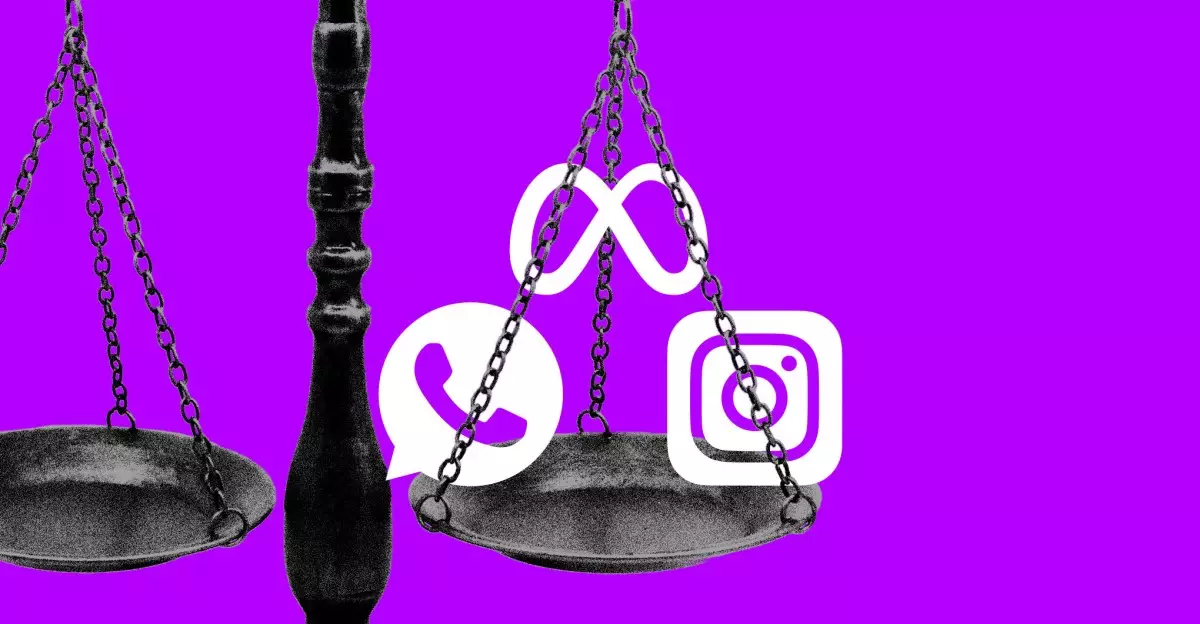The ongoing antitrust trial of FTC v. Meta has unfurled a dramatic narrative at the intersection of innovation, acquisition, and competition. Mark Zuckerberg, CEO of Meta, stands resolutely against the government’s assertion that the purchases of Instagram and WhatsApp were tactical moves to eliminate competition. Instead, Zuckerberg’s testimony identifies a recurring theme: a proactive vision aimed at enhancing user engagement and adapting to a rapidly evolving digital landscape.
Zuckerberg’s conviction that his acquisitions were pivotal for maneuvering through the complexities of social media evolution highlights a fundamental ethos within the tech industry: the necessity for companies to adapt to user behavior promptly. As a magnate in technology, he expressed a notable confidence that the trajectory of WhatsApp and Instagram could redefine online interactions, moving from an open, public discourse to more intimate, private exchanges. This transition resonates with a growing trend among users who prioritize privacy—a sentiment that no longer feels relegated to niche users but has now become mainstream.
Confirmed Investments or Covert Hostility?
The trial has revealed the stark contrasts between the FTC’s claims and Zuckerberg’s narrative. Under scrutiny, Zuckerberg reflected on his willingness to pay $19 billion for WhatsApp, starkly asserting that he would make the same investment today. This sentiment represents a powerful juxtaposition against the FTC’s narrative of predatory acquisition. Both WhatsApp and Instagram have transformed not only into colossal platforms but foundational pillars upon which Meta has expanded its business model. Zuckerberg argues that these platforms have become revenue streams—boasting nearly $10 billion annually through interactions facilitated within WhatsApp and Instagram’s realms.
However, conversations during the trial reveal deeper layers of strategy. Skepticism arose around Zuckerberg’s depiction of Instagram’s competition with Facebook, especially following internal emails that implied potential harm to Facebook’s user engagement. Despite this, Zuckerberg asserted a timeline of events that framed Instagram’s ascendance as a subsequent phenomenon. This raises valid questions about whether Zuckerberg’s accurate assessments faced clashes with his initial reluctance—the fluctuating dynamics of competition versus collaboration within the tech space, as witnessed between Facebook and Instagram.
Existential Threats and Strategic Leverage
One of the more striking moments during Zuckerberg’s testimony was his candid acknowledgment of his apprehensions regarding tech giants like Apple and Google. His framing of the acquisition as a strategic move to fortify Meta’s position against these companies, which control app distribution channels, offers unique insight into his leadership mindset. Zuckerberg viewed WhatsApp as a negotiating tool, intended to provide a buffer against potential adversities that could alter Meta’s operational framework significantly.
This perspective calls attention to a notable aspect of entrepreneurship—the intrinsic threat posed by larger power structures. Zuckerberg’s recognition of such threats reflects a reality that many tech entrepreneurs face: that of navigating an ecosystem where giants dictate terms, and strategic acquisitions are often necessary for survival. However, he acknowledged the tenuous nature of this strategy, recognizing that it may not have ultimately afforded him the anticipated bargaining power.
Data-Driven Management: From Acquisition to Expansion
Zuckerberg’s testimony dove into the historical trajectory of Instagram’s growth, revealing a remarkable leap from shy beginnings with a mere 10 million users to surpassing 2 billion. This evolution was not incidental but a direct result of the resources made available by Meta post-acquisition. The testimony dismantles any notions that Instagram’s success was purely coincidence; rather, it illustrates a calculated, data-driven approach to growth.
It serves as a testament to the efficacy of investing in innovation and scaling—two principles that are essential for tech companies in today’s ecosystem. Zuckerberg’s foresight in establishing benchmarks and driving user growth within Instagram indicates a comprehension of market dynamics often overlooked by critics who suggest malicious intent behind acquisitions.
Finding Value in Retrospective Critique
Former Meta COO Sheryl Sandberg’s candid admission of misjudgment regarding the Instagram acquisition adds an intriguing layer of introspection. Her acknowledgment of concerns over overpayment, followed by a realization that the acquisition was, in hindsight, a strategic masterstroke, underscores a broader narrative of growth that resonates beyond mere financial metrics. This honesty reflects an industry grappling with the challenges of foresight and judgment—a journey marked by retries, revisions, and revelations.
As the case progresses, it will be essential to dissect the implications of Zuckerberg’s testimony on broader antitrust discourse—paving the way for a deeper understanding of what constitutes competition in the digital era. The complexity of achieving balance in fostering innovation while ensuring fair competition is an ongoing conversation that resonates at multiple levels, encapsulating the very essence of how tech enterprises will evolve moving into the future.

